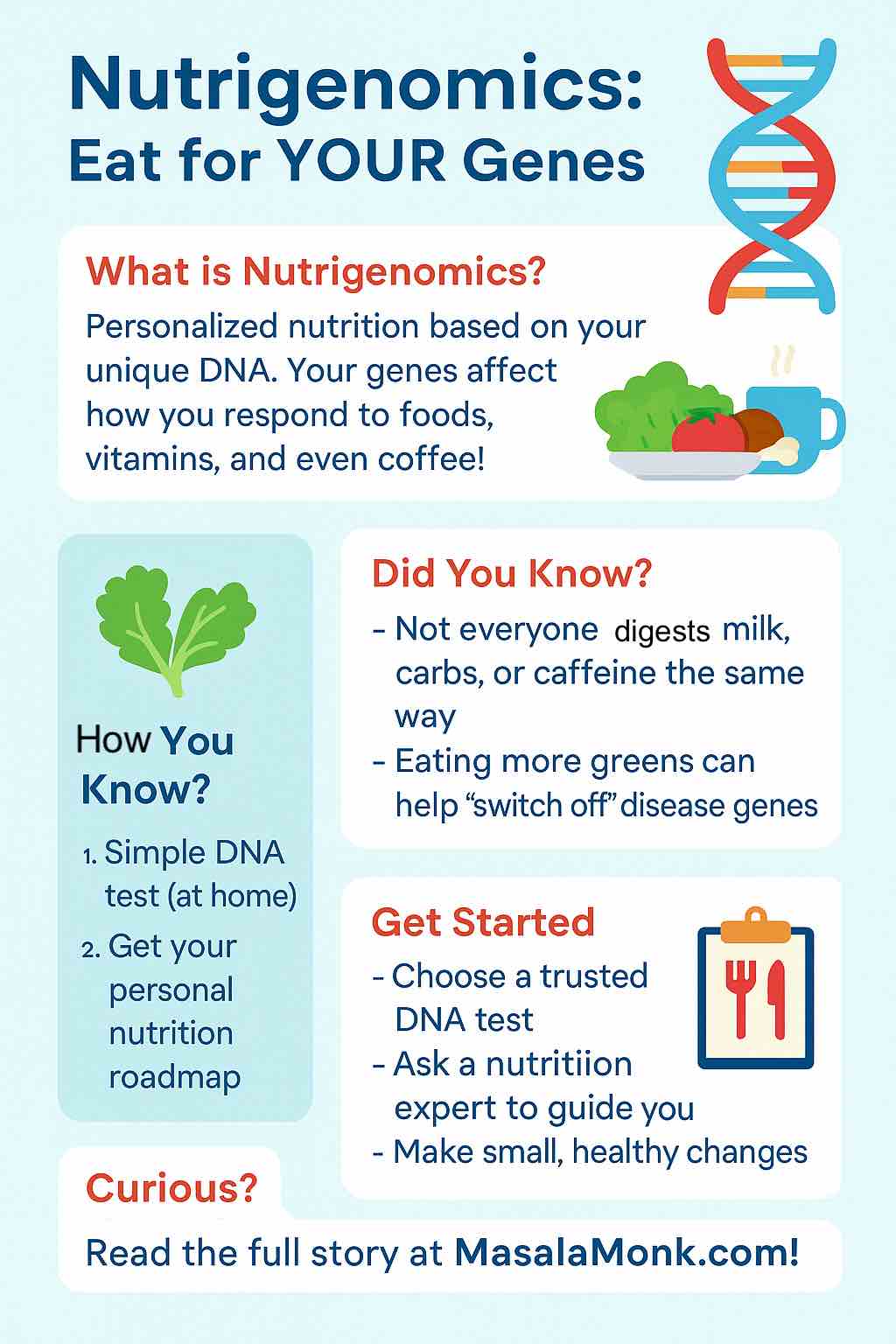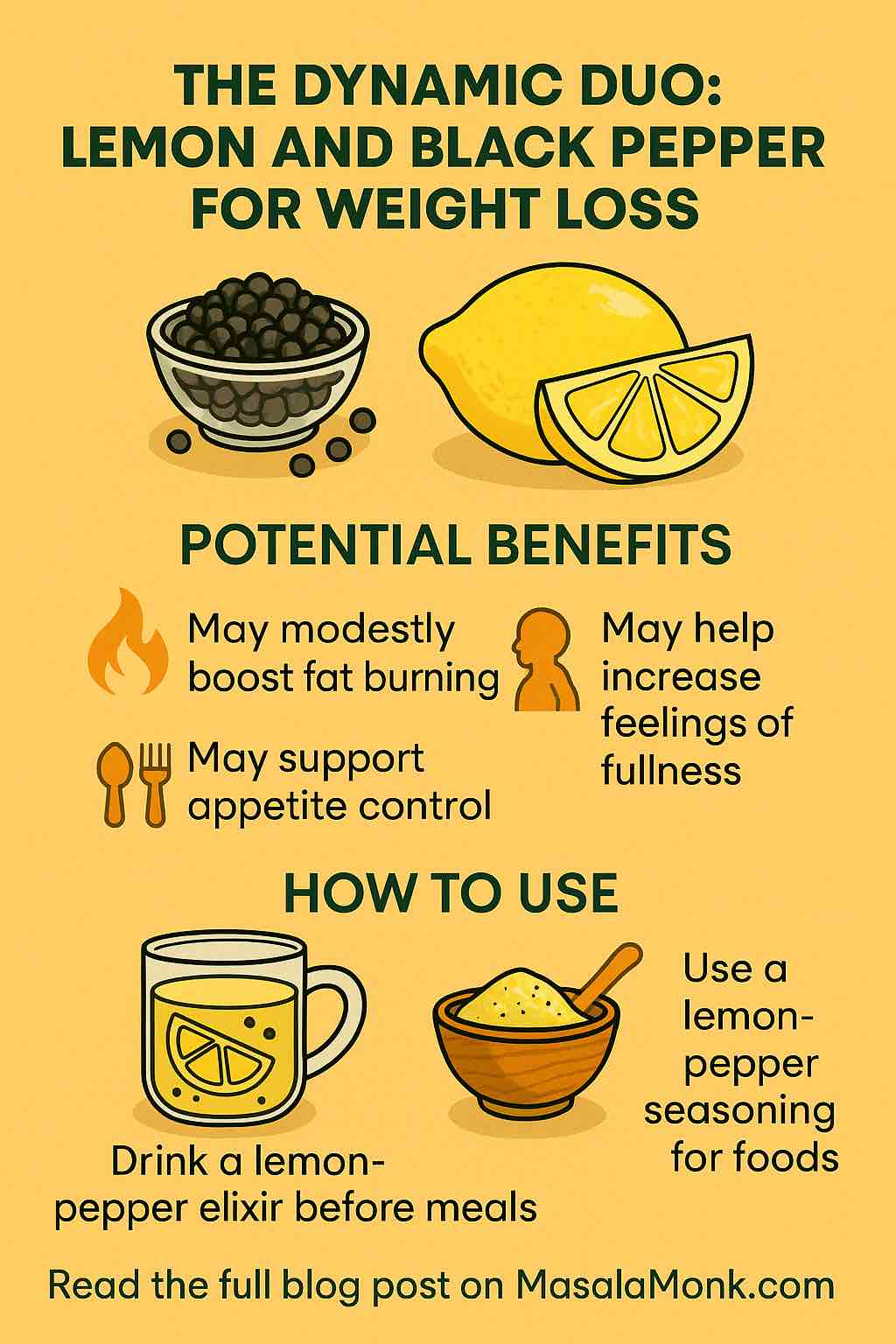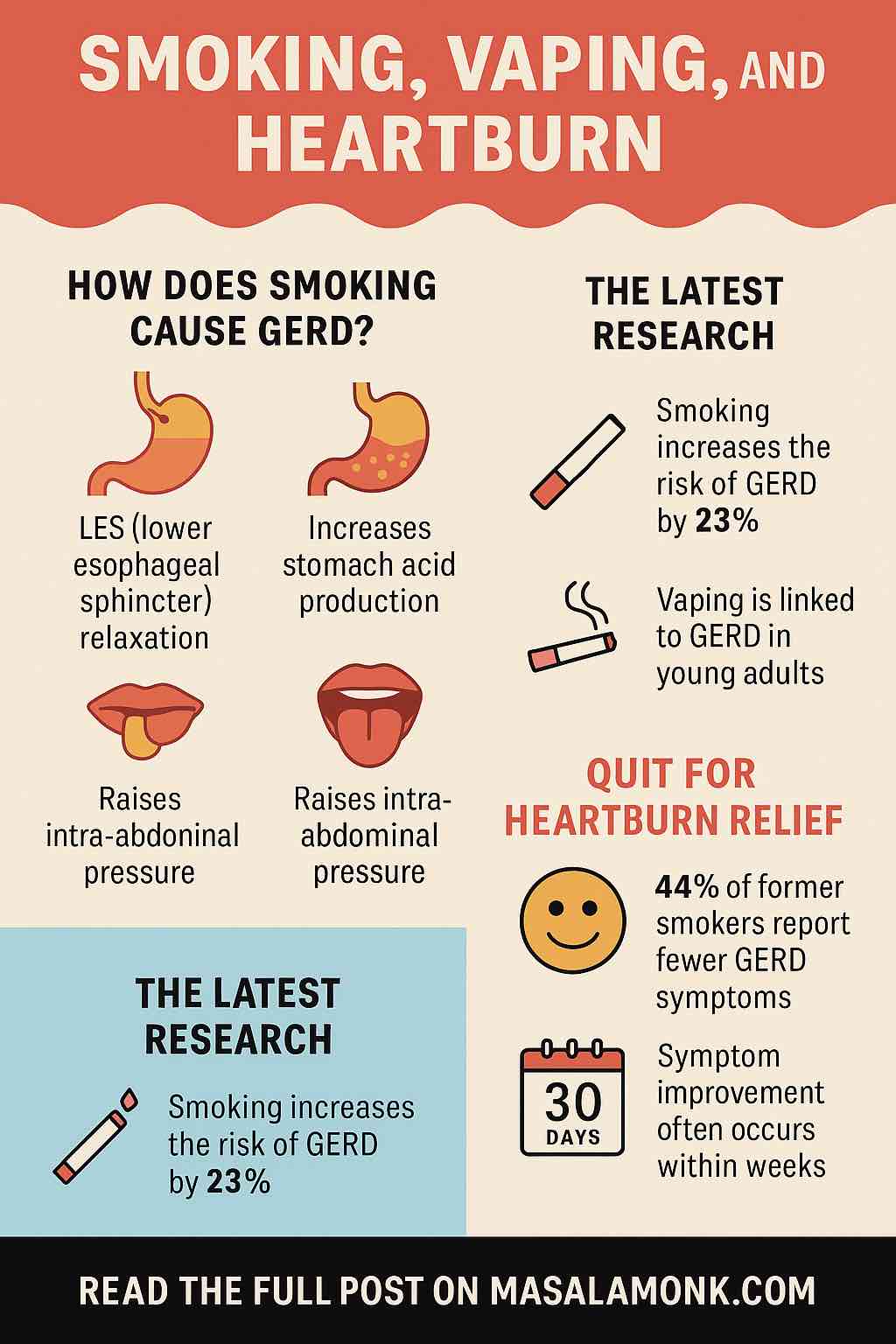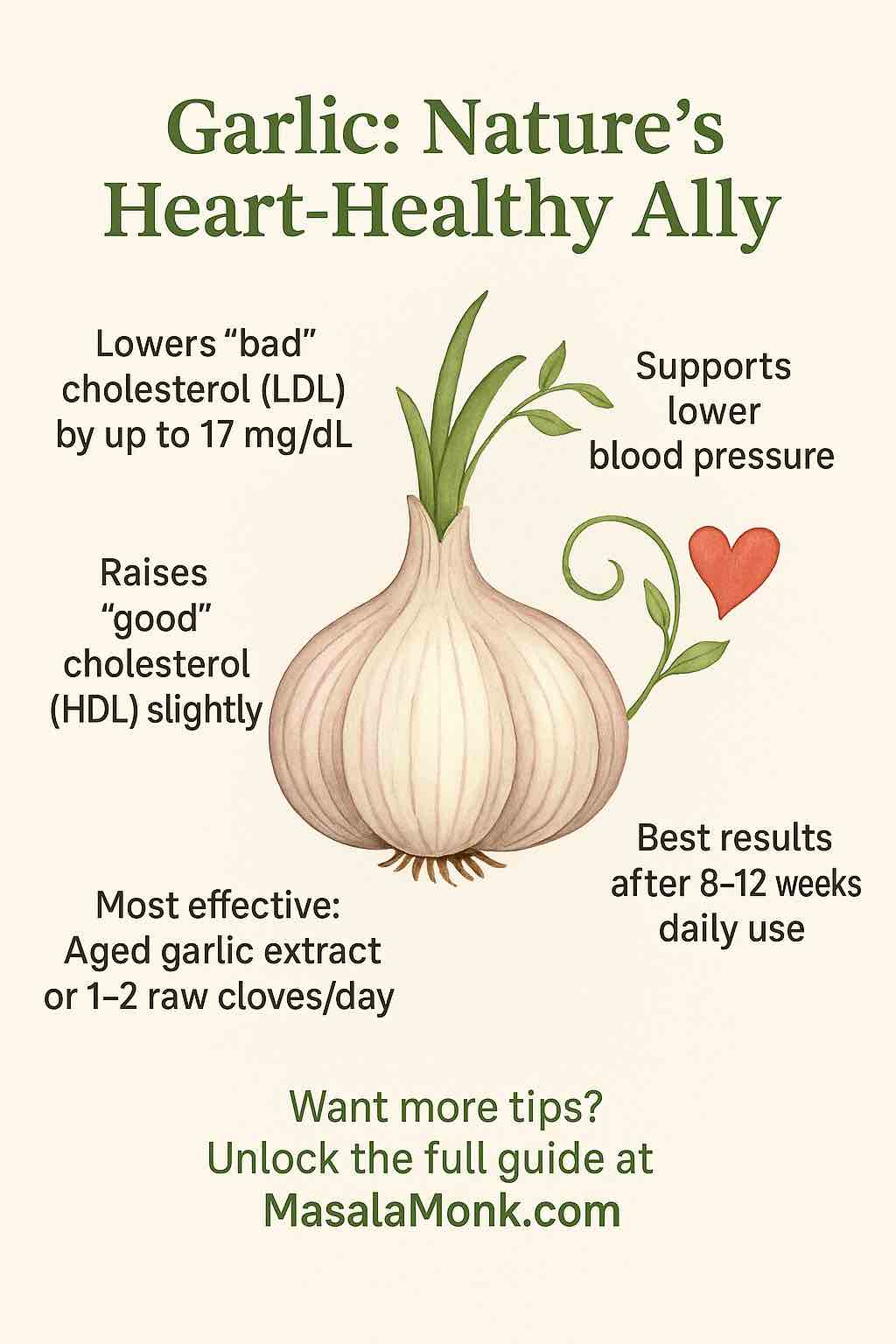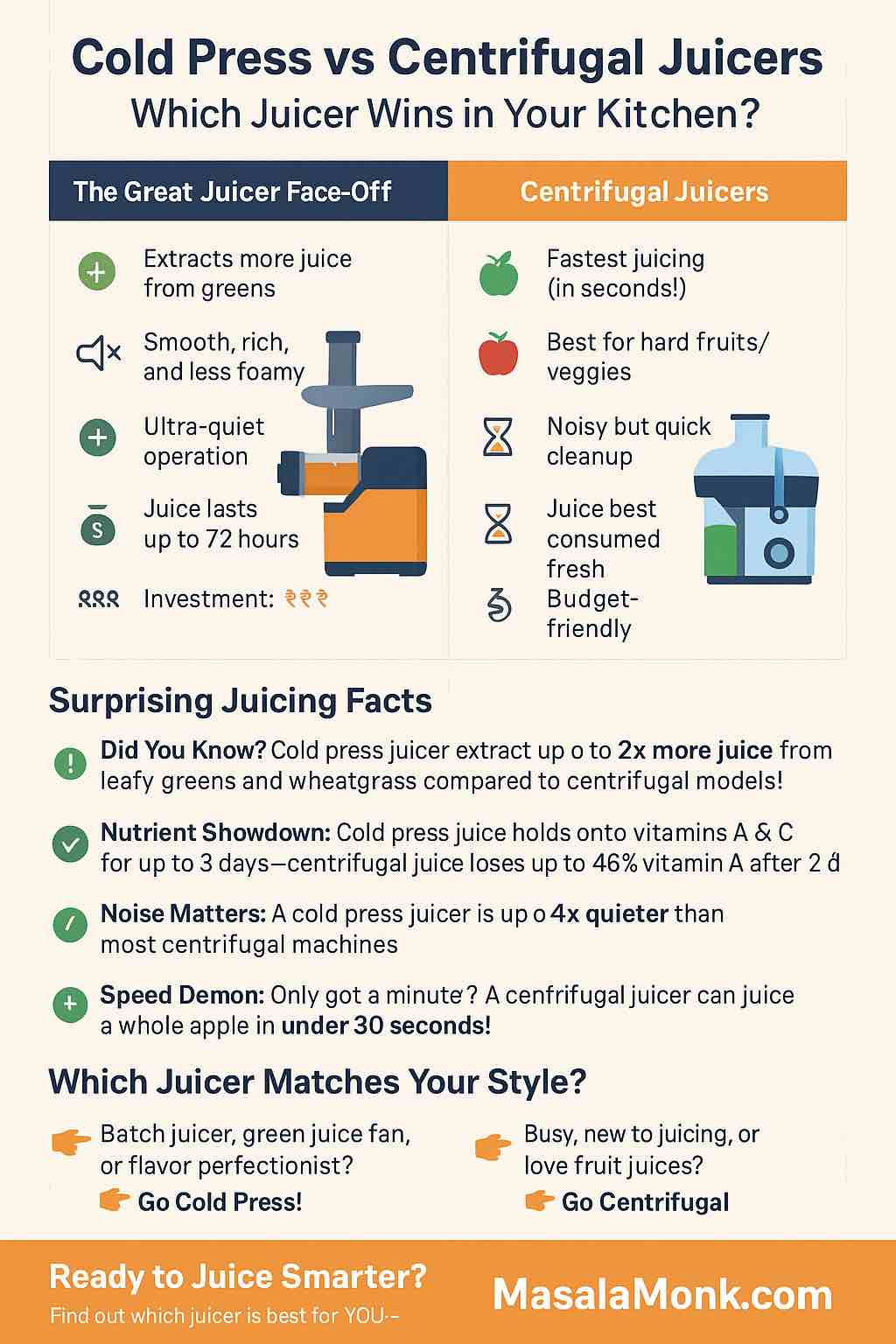
Juicing is no longer just a wellness trend—it’s a kitchen staple for many health-focused homes. But if you’re just getting started or looking to upgrade your juicer, you’ve probably faced the classic dilemma:
Should you get a Cold Press (Masticating) Juicer or a Centrifugal Juicer?
This isn’t just a tech comparison—it’s about what’s best for your lifestyle, health goals, and taste buds. In this guide, I’ll break down the differences, bust a few myths, and help you choose with confidence.
What’s the Difference, Really?
Centrifugal juicers are the “classic” juicers you see in most stores. They’re fast, loud, and use a rapidly spinning blade to pulverize fruits and veggies, extracting juice via centrifugal force.
Cold Press (Masticating) juicers work differently. They “chew” produce at a low speed with an auger, gently crushing and pressing out juice. This slow process creates little heat, hence the term “cold press.”
How Does This Affect Your Juice?
Let’s get practical. Here’s how these two styles shape your daily juice routine:
1. Juice Quality & Nutrition
- Cold Press Juicers
- Higher juice yield. Get more juice (especially from leafy greens, wheatgrass, and soft fruits).
- Richer flavor. Juice is smoother, less foamy, and has deeper color.
- More nutrients—especially over time. Scientific studies show cold press juice retains more vitamins (notably A and C) after 48–72 hours. If you like to batch juice, this matters!
- Minimal oxidation. Juice stays fresh longer (up to 3 days refrigerated) and separates less.
- Centrifugal Juicers
- Fast, fresh juice in seconds. Best for “drink it now” types.
- Slightly less nutrient retention. Lab studies show only ~10–15% difference at the moment of juicing, but nutrients degrade much faster in storage.
- More foam, faster separation. Texture can be frothier, and you’ll see layers form in your glass if you wait.
Bottom line: For best flavor and nutrition—especially with leafy greens or if you batch juice—cold press wins. If you drink juice immediately and don’t mind a little foam, centrifugal works just fine.
2. Speed & Convenience
- Centrifugal Juicers
- Fastest option by far!
Whole apple? No problem—done in under a minute. - Large feeding chute. Minimal chopping needed.
- Ideal for busy mornings or families on the go.
- Fastest option by far!
- Cold Press Juicers
- Slower extraction—usually 2–5 minutes for a glass.
- Smaller feeding chute. Chopping is often required.
- More parts to assemble/disassemble.
Bottom line: If you want juice NOW and minimal prep, centrifugal is hard to beat.
3. Noise Level
- Centrifugal Juicers: Like a blender. Loud.
- Cold Press Juicers: Whisper-quiet. Perfect for early risers or shared homes.
4. Cleaning
- Centrifugal:
- Fewer parts, wide openings—quick rinse and done.
- Cold Press:
- More components (auger, mesh, chute). Takes a few extra minutes and a brush to keep clean.
TIP: If you dread cleaning, check reviews—some newer cold press models have improved, but centrifugal remains the simplest.
5. Cost
- Centrifugal Juicers:
- Great entry models for $40–$150.
- Cold Press Juicers:
- Usually $150–$500+. High-end models can reach $700+.
Pro tip: Don’t just buy the cheapest! A sturdy $120 centrifugal or a $250–$350 cold press will outlast and outperform bargain-bin options.
6. Produce Types
- Leafy Greens, Herbs, Wheatgrass:
- Cold press is far superior. Centrifugal juicers struggle and waste produce.
- Hard Fruits (apples, carrots, beets):
- Both work well, but centrifugal is faster.
- Soft Fruits (berries, tomatoes, kiwi):
- Cold press gives higher yield and less mess.
Myths & Misconceptions: What Science Says
- “Centrifugal juicers destroy nutrients!”
Not exactly. The heat is modest (juice rarely gets above 50°C/122°F). Studies show a slight difference (10–15%) in vitamin retention at extraction, but the real gap is in storage: cold press juice stays nutritious much longer. - “Cold press juice is always healthier.”
Not always. For some nutrients (like lycopene in tomatoes), gentle heat from centrifugal juicers can actually improve absorption. The overall difference for most people is modest if you drink the juice immediately. - “Cold press is only for the obsessed.”
Nope! If you love greens, want to prep juice ahead, or value taste/texture, you’ll love cold press. But centrifugal makes great juice too—especially for fruit-focused recipes.
Which Should You Choose? A Practical Guide
Get a Cold Press Juicer if:
- You juice leafy greens, herbs, or wheatgrass often.
- You want to batch juice for 2–3 days.
- Taste, texture, and nutrient retention matter to you.
- You don’t mind a slower, quieter process (and a bit more cleanup).
- Budget isn’t your biggest concern.
Get a Centrifugal Juicer if:
- You’re new to juicing and want something quick, easy, and affordable.
- You mainly juice hard fruits and veggies.
- You’ll drink juice right away.
- Speed and simplicity matter most.
- You want less cleanup.
Real-World Examples
- Busy Parent:
You want fresh apple-carrot juice every morning, with minimal hassle. A good centrifugal juicer lets you prep, juice, and clean in 5 minutes. - Wellness Enthusiast:
You juice kale, ginger, celery, and batch prep for the week. A cold press model gives you better taste, higher yield, and juice that lasts up to 72 hours in the fridge. - On a Budget:
Start with a solid centrifugal juicer. If you fall in love with juicing, upgrade later!
Popular Models (2025 Recommendations)
Best Centrifugal Juicers
- Breville Juice Fountain Plus: Fast, reliable, wide chute.
- Hamilton Beach Big Mouth: Budget pick, easy cleanup.
Best Cold Press (Masticating) Juicers
- Omega NC900HDC: High yield, superb for greens.
- Nama J2: Newer, auto-feeding, minimal prep.
- Hurom H-AA: Compact, very quiet.
Final Thoughts: What’s Right for You?
The “best” juicer is the one that fits your habits, kitchen, and goals. Both types can deliver delicious, healthful juice at home.
If you want the most juice from every spinach leaf and care about longevity—go cold press. If you crave convenience, drink juice right away, and want a smaller upfront investment—centrifugal is perfect.
Remember:
The healthiest juice is the one you’ll actually make and drink!
Practical Tips for Better Juicing (No Matter the Juicer)
- Prep produce ahead: Chop, wash, and bag portions for the week.
- Alternate soft and hard produce: This helps both juicer types avoid clogs.
- Clean immediately: Rinse parts right after use for easy cleanup.
- Drink soon: Even cold press juice is best within 48 hours for flavor and nutrients.
- Experiment: Try both methods at a juice bar before you buy—or borrow a friend’s machine.
Have Questions or a Juicer Story?
Drop a comment below! Which juicer do you use? What surprised you about your first juicing experience? Let’s share real-world tips and favorite recipes!
Happy juicing—whatever you choose!
10 Frequently Asked Questions (FAQs) About Cold Press vs Centrifugal Juicers
1. Which juicer is better for leafy greens and wheatgrass?
Cold press (masticating) juicers are far superior for leafy greens, wheatgrass, and herbs. They extract significantly more juice and nutrients, whereas centrifugal juicers often leave these types of produce almost dry and wasteful.
2. Can I store juice from both juicers, and for how long?
Cold press juice can be stored in the refrigerator for up to 72 hours with minimal loss of nutrients and flavor. Juice from centrifugal juicers should ideally be consumed within 24 hours due to faster nutrient degradation and oxidation.
3. Is there a big difference in nutrition between the two types?
There is a modest difference—cold press juicers retain about 10–15% more vitamins and antioxidants, especially after storing. For immediate drinking, the nutritional gap is small, but it widens if you batch juice.
4. Are cold press juicers really that much quieter?
Yes, cold press juicers operate at low speeds and are much quieter than centrifugal juicers, which are about as loud as a blender. This makes cold press ideal for early mornings or shared spaces.
5. What are the main cleaning differences?
Centrifugal juicers usually have fewer parts and are quicker to clean, often taking just a couple of minutes. Cold press juicers have more components, including a mesh screen and auger, and can take a few extra minutes and a brush to clean thoroughly.
6. Why are cold press juicers so much more expensive?
Cold press juicers use more complex, durable mechanisms and often yield more juice per produce—saving money in the long run if you juice regularly. You’re paying for higher juice quality, better yield, and longer juice shelf life.
7. Do centrifugal juicers work with soft fruits?
They can, but you’ll often get a thinner, more separated juice and less yield. Cold press juicers are much better for soft fruits like berries, tomatoes, and kiwi.
8. Is it true centrifugal juicers destroy enzymes and nutrients with heat?
Not really. The heat generated is minimal and doesn’t destroy nutrients outright. However, the oxidation from the fast spinning can reduce some sensitive nutrients and shortens shelf life, especially for vitamins A and C.
9. Which type of juicer is best for beginners?
Centrifugal juicers are best for beginners—they’re affordable, fast, and easy to use. They’re great for occasional or fruit-focused juicing. If you become a regular juicer or want to maximize yield from greens, you can upgrade to cold press later.
10. Can I use both types of juicers together?
While not necessary for most people, some serious juicers do use both: centrifugal for fast, everyday fruit juices and cold press for batch-prepped or green juices. If budget and space allow, having both gives ultimate flexibility.

